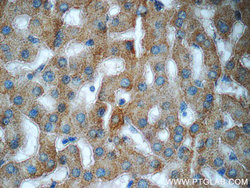Antibody data
- Antibody Data
- Antigen structure
- References [8]
- Comments [0]
- Validations
- Western blot [1]
- Immunohistochemistry [1]
Submit
Validation data
Reference
Comment
Report error
- Product number
- 17975-1-AP - Provider product page

- Provider
- Proteintech Group
- Proper citation
- Proteintech Cat#17975-1-AP, RRID:AB_2242349
- Product name
- Acetylcholinesterase antibody
- Antibody type
- Polyclonal
- Description
- Acetylcholinesterase antibody (Cat. #17975-1-AP) is a rabbit polyclonal antibody that shows reactivity with human, mouse, rat and has been validated for the following applications: IHC, WB, ELISA.
- Reactivity
- Human, Mouse, Rat
- Host
- Rabbit
- Conjugate
- Unconjugated
- Isotype
- IgG
- Vial size
- 20ul, 150ul
Submitted references Cholinergic signaling via muscarinic M1 receptor confers resistance to docetaxel in prostate cancer.
Pyridostigmine Protects Against Diabetic Cardiomyopathy by Regulating Vagal Activity, Gut Microbiota, and Branched-Chain Amino Acid Catabolism in Diabetic Mice.
A diet high in sugar and fat influences neurotransmitter metabolism and then affects brain function by altering the gut microbiota.
Maternal high sugar and fat diet benefits offspring brain function via targeting on the gut-brain axis.
A five-m6A regulatory gene signature is a prognostic biomarker in lung adenocarcinoma patients.
Near-Infrared Fluorescence Probe for Evaluating Acetylcholinesterase Activity in PC12 Cells and In Situ Tracing AChE Distribution in Zebrafish.
Quantification of heat shock protein 70 and acetylcholinesterase over a time course suggests environmental adaptation in a foundational molluscan species.
Lithium attenuates scopolamine-induced memory deficits with inhibition of GSK-3β and preservation of postsynaptic components.
Wang J, Wei J, Pu T, Zeng A, Karthikeyan V, Bechtold B, Vo K, Chen J, Lin TP, Chang AP, Corey E, Puhr M, Klocker H, Culig Z, Bland T, Wu BJ
Cell reports. Medicine 2024 Feb 20;5(2):101388
Cell reports. Medicine 2024 Feb 20;5(2):101388
Pyridostigmine Protects Against Diabetic Cardiomyopathy by Regulating Vagal Activity, Gut Microbiota, and Branched-Chain Amino Acid Catabolism in Diabetic Mice.
Yang Y, Zhao M, He X, Wu Q, Li DL, Zang WJ
Frontiers in pharmacology 2021;12:647481
Frontiers in pharmacology 2021;12:647481
A diet high in sugar and fat influences neurotransmitter metabolism and then affects brain function by altering the gut microbiota.
Guo Y, Zhu X, Zeng M, Qi L, Tang X, Wang D, Zhang M, Xie Y, Li H, Yang X, Chen D
Translational psychiatry 2021 May 27;11(1):328
Translational psychiatry 2021 May 27;11(1):328
Maternal high sugar and fat diet benefits offspring brain function via targeting on the gut-brain axis.
Wang D, Zhang H, Zeng M, Tang X, Zhu X, Guo Y, Qi L, Xie Y, Zhang M, Chen D
Aging 2021 Mar 26;13(7):10240-10274
Aging 2021 Mar 26;13(7):10240-10274
A five-m6A regulatory gene signature is a prognostic biomarker in lung adenocarcinoma patients.
Wu X, Sheng H, Wang L, Xia P, Wang Y, Yu L, Lv W, Hu J
Aging 2021 Mar 26;13(7):10034-10057
Aging 2021 Mar 26;13(7):10034-10057
Near-Infrared Fluorescence Probe for Evaluating Acetylcholinesterase Activity in PC12 Cells and In Situ Tracing AChE Distribution in Zebrafish.
Ma J, Si T, Yan C, Li Y, Li Q, Lu X, Guo Y
ACS sensors 2020 Jan 24;5(1):83-92
ACS sensors 2020 Jan 24;5(1):83-92
Quantification of heat shock protein 70 and acetylcholinesterase over a time course suggests environmental adaptation in a foundational molluscan species.
Ravaschiere A, Cutler C, Edleson K, Halem Z, Magun H, Meckler F, Cox R
Ecotoxicology and environmental safety 2017 Aug;142:222-229
Ecotoxicology and environmental safety 2017 Aug;142:222-229
Lithium attenuates scopolamine-induced memory deficits with inhibition of GSK-3β and preservation of postsynaptic components.
Wu YY, Wang X, Tan L, Liu D, Liu XH, Wang Q, Wang JZ, Zhu LQ
Journal of Alzheimer's disease : JAD 2013;37(3):515-27
Journal of Alzheimer's disease : JAD 2013;37(3):515-27
No comments: Submit comment
Supportive validation
- Submitted by
- Proteintech Group (provider)
- Main image

- Experimental details
- mouse liver tissue were subjected to SDS PAGE followed by western blot with 17975-1-AP(ACHE antibody) at dilution of 1:500
- Sample type
- tissue
Supportive validation
- Submitted by
- Proteintech Group (provider)
- Main image

- Experimental details
- The ACHE antibody from Proteintech is a rabbit polyclonal antibody to a recombinant protein of human ACHE. This antibody recognizes human,mouse,rat antigen. The ACHE antibody has been validated for the following applications: ELISA, WB, IHC analysis.
 Explore
Explore Validate
Validate Learn
Learn Western blot
Western blot ELISA
ELISA